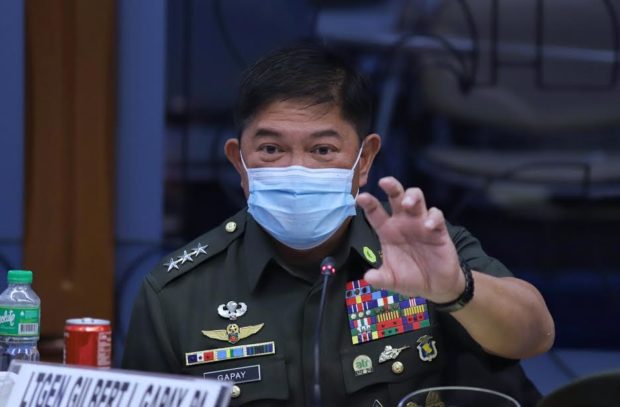
Armed Forces of the Philippines (AFP) Chief of Staff Lt. Gen. Gilbert Gapay appears before the Senate Committee on Public Order and Dangerous Drugs hearing Wednesday, August 19, 2020. The panel, chaired by Sen. Ronald “Bato” Dela Rosa, is looking into the fatal shooting of four Army iltelligence officers reportedly by Philippine National Police personnel in Sulu last June 29, 2020. Senate PRIB photo / Joseph Vidal
MANILA, Philippines — Armed Forces of the Philippines (AFP) chief of staff Lt. Gen. Gilbert Gapay on Wednesday alleged that there was an attempt on the part of the Philippine National Police (PNP) to cover up the misdeeds of the nine police officers involved in the fatal shooting of four military intelligence officers in Sulu last June.
“[If the] PNP would be investigating the misdeeds of their own, minsan kasi, nandun na yung opportunity na magkaroon ng bias,” Gapay said during the hearing of the Senate public order committee.
([If the] PNP would be investigating the misdeeds of their own, sometimes, there is the opportunity to be biased.)
Gapay said he found the incident “very unique” since the military and police have always had close coordination with each other.
“The close coordination between the AFP and the PNP has produced significant accomplishments not only against local terrorists…but as well as the anti-criminality campaign, napakaganda [it was effective],” the military official said.
“Ito lang talagang nakakapagtaka,” he added, referring to the incident that claimed the lives of four Army officers.
(This incident puzzles us.)
“For several years, okay naman tayo but for this particular operation, bakit ganito ang nangyari? There’s something wrong here,” he further said.
(For several years, our coordination has been okay but for this particular operation, why did this happen? There’s something wrong here.)
He also said that the initial spot report of the police on the incident was “fabricated” and had many “inconsistencies.”
“When we read the spot report, we already have an overview of what really happened. We find it really fantastic, unbelievable na tumakas yung sasakyan, habulan and then flagged down, bumaba, nagkaputukan..there was a firefight. Misencounter nga yun terminology,” Gapay said.
(When we read the spot report, we already have an overview of what really happened. We find it really fantastic, unbelievable that the vehicle of the military officers sped off, a car chase ensued, then they alighted from the vehicle, and then a shooting transpired…there was a firefight. The terminology used then was misencounter.)
“Checkpoint pa lang, alam nila military ‘yan [they know they are members of the military],” he added.
The military officers who were killed were dispatched by the Joint Intelligence Task Group and the Task Force Sulu after technical intelligence detected the possible location of two female suicide bombers and the maker of their suicide vests.
According to Gapay, the military had informed the police about the anti-terrorism operation of the four soldiers.
“Alam din ng partners natin in the PNP na may operation…Our personnel, walang threat dahil kabaro natin ito…Nung mabasa namin yung report: ‘Bakit ganito na nangyari?’ Parang may cover-up na may angle na self-defense,” he added.
(Our partners in the PNP knows about that operation… Our personnel, they were not a threat because they are on the same side….When we read the report: ‘How did this come about?’ It seems that there is a cover-up, there is now an angle of self-defense.)
‘No firefight’
Gapay said that upon reading the police’s initial spot report, he immediately sought the help of the NBI for an impartial investigation into the incident.
“We requested the NBI to assist in the investigation because, dun palang sa spot report, we have the feeling that we would want to get an impartial investigation on this,” he told senators.
Citing the initial investigation of the National Bureau of Investigation (NBI), which is probing the incident, Gapay stressed that no firefight ensued between the two forces.
“Based on the report of the NBI, talagang there was no firefight,” he said.
The four military intelligence officers were shot dead near the Jolo police station in Sulu last June 29.
The Army officers had identified themselves to the policemen but were still shot by the policemen when one of the officers alighted unarmed from the sports utility vehicle (SUV) they were riding in.
The police, however, offered a different version of what happened.
The Sulu police force claimed that its men stopped the SUV carrying the intelligence officers and instructed them to proceed to a nearby police station for verification of identities.
According to the PNP, the SUV sped off as both forces neared the Jolo police station, which triggered a car chase. Police said they only defended themselves as the soldiers opened fire.
But the NBI investigation showed that the police officers simultaneously attacked the Army intelligence officers without “the opportunity to defend themselves.”
The NBI has already filed a murder complaint against the nine police officers for the death of the four military officers.
‘No side’
PNP chief Gen. Archie Gamboa, who was also present during the hearing, said the investigation conducted by the NBI did not include the side of the nine policemen.
“At the time the NBI conducted their investigation, the nine policemen from Jolo did not air their side, because probably upon the advice of their counsel,” Gamboa said.
“So their conclusion, the basis of filing charges to these are based on evidence, both material that they have gathered so I suggest that that portion of criminal charges will be tackled by the courts, let them determine whether the nine are really guilty of those charges,” he added.